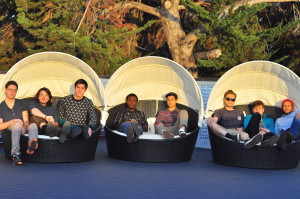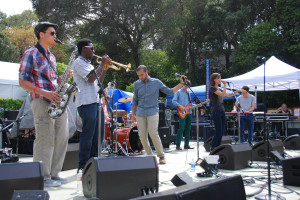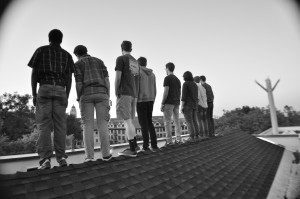“I heard you’re taking the summer off,” said a friend of Gavin Leeper ’13.
Leeper — the lead guitarist, visionary and de facto band leader of Paper Void — had just spent 13 hours this past Sunday on the band’s upcoming EP, titled “Unfold” — for which there will be a release party from 8 p.m. to 11 p.m. in the rear room of El Rio, San Francisco tonight.
“It’s a project I really want to push as far as it can go,” Leeper said about the band when I asked about summer projects.
On “taking the summer off,” he said, “Nothing could be further from that. In some ways, I think there wouldn’t be that confusion at all if I said I was taking the summer to work on my start-up.”
Startups, entrepreneurs, all that jazz

For a band like Paper Void in a place like Stanford, it isn’t far-fetched to refer to the project as “entrepreneurial” or “like a startup.”
“What’s going on in the Bay Area is truly unique,” said lecturer Robert Siegel at Stanford’s Graduate School of Business. “The incredible focus on entrepreneurship dominates the culture, and Stanford is at the epicenter.”
Siegel is also a startup guru for The Wall Street Journal and a general partner at XSeed Capital, an early stage investment firm.
At the time of my interview with the original members of Paper Void in an earlier feature, three members of eight — Leeper; keyboardist until mid-June Jeremy Schreier ’14; and MC Alberto Guzman ’13 — likened Paper Void to a start-up at some point in the conversation. Three others — tenor saxophonist Alex Ramsey ’17; trumpet player until mid-June, Isaac Ghansah ’14; lead singer until early May,JP Wright ’12 — hadn’t thought of or mentioned the parallel. Schreier regretted making mention of the analogy, and the last two — drummer Alex Favaro ’13 and bassist Evan Gitterman ’14 — hated the terms “startup” and “entrepreneur.”
“I don’t want to get into that,” Gitterman said simply, shaking his head.
French economist Robert Cantillon first coined the term “entrepreneur” to mean someone who “pays a certain price for products and services to resell them at an uncertain price in the market.” It isn’t surprising Gitterman is opposed to an analogy that hypothetically relates creative expression to impersonal terms like “price,” “products and services” and “market.”
According to Siegel there are “two forces that can be diametrically opposed” in entrepreneurship, especially when it intersects with the arts — creativity and economic success. In his blog, Siegel notes that while the culture of Silicon Valley espouses goodwill in “unprecedented scale,” it has also bred materialism and a focus on success measured specifically in economic terms. This in part is fueled by the lucrativeness of companies worth billions: Google, Apple, Hewlett-Packard, to name a few. There is even a term for overvalued companies that achieve “extreme wealth and extreme commercial success” — unicorns.
On the relationship between economic success and creative expression, Siegel said, “There’s the potential for backlash to the idea of entrepreneurship in the arts.”
“I really just want to play music because I enjoy playing music,” Gitterman said. “I think that’s a fundamental difference from any startup.”
Yet while there is no denying this focus on maximizing the “uncertain price in the market” in the Silicon Valley, neither is there denying the essence of Cantillon’s “entrepreneur”: risk-taking.
One evening, he passed by the shrill, unmistakable whine of a violin coming from a window of a Munger Graduate Residence building. “Hey!” he shouted — and ended up trying to include the violinist in a future gig with Paper Void. The plan fell through.
“Some people say it wastes my time, but trying something new and putting time into that is always extremely valuable,” he said. “It’s part of the game. You have to try things, you have to trust people.”
And in the end, he was able to find people for the quartet he wanted
Three important aspects of a startup — group dynamic, individual roles and followers — coincide with the components of successful music groups, according to Damon Phillips, professor at Columbia Business School and author of “Shaping Jazz.”
Upon closer examination of Paper Void, there is much more to the relationship between entrepreneurship and the arts than simple rivalry of concepts.
‘The soul is coming out’
“In startups, chemistry is critical — much like musical groups,” Phillips said. He draws the line at businesses, where a more impersonal structure allows the company to function even without the “chemistry,” or empathy.
The indirect consequence of Leeper’s efforts in recruitment is that the members of Paper Void didn’t start out with the kind of chemistry that bonds a band like The Strokes, for instance. While members of The Strokes knew each other personally and musically as early as they were in preparatory school, only Schreier and Gitterman, and separately, Favaro and Wright, had played together extensively. As a whole, the band had been neither musically nor socially close.
Yet despite that, and the changing membership of the band from Mayuntil now, there was always a level of chemistry that kept Paper Void together. It came from the sound of the band — downtempo, which is a blend of hip-hop, jazz, funk and electronic.Guzman brings up the concept of flow to describe the band’s style — “It’s something we all experience when we’re really in the zone and when we’re really into it, we get lost in time. Jazz embodies flow perfectly — it starts off with a loose structure, but everything else is so real, so very natural, the soul is coming out — it’s crazy, you know? It’s magical.”
The jazz component of the band involves — of course — heavy improvisation, resulting in close attention from and to all members of the band. The genre has a meditative quality, but is also highly technical — something Leeper considered prior to the band’s formation when he and Wright discussed logistics of a band. The success of a band, especially one on a high-achieving college campus, would require high technical skill because of people’s packed schedules.
Schreier said, “I had jammed with so many people [on campus] that I really feel comfortable sitting in on any jazz gig.”
“If you can play jazz, you can play any type of contemporary music because it’s really complex. It’s a difficult style to be good at,” Favaro said.
Yet another factor that balances out the band dynamic is everyone’s desire for musical self-improvement.
“A good band is always moving, never stagnating,” Favaro said. “In Paper Void, everyone is interested in making an original sound, but also improving ourselves as musicians.”
This constant improvement of technical skill and desire to improve the band’s sound has allowed for high levels of creativity, such as during the band’s arrangement of Guzman’s original, “Till Then.” During a rehearsal, Gitterman suddenly had the idea for the band to do rhythmic hits during one part of the song while Favaro used drum fills.
“We’ve gotten a lot better at jamming and being spontaneous, and it makes it a lot more fun,” Gitterman said. “We still listen to the songs [we cover] and try to be faithful to the original, but people are a lot more comfortable with being creative and doing it their own way, throwing in a little bit of spice.”
“Most professional” is the superlative that the members use to describe Paper Void.
Leeper describes the way he runs Paper Void as “the laidback version of Stanford Taiko,” where he was performance manager for a year and what he considers as one of the most well-run music groups on campus. During the school year, rehearsals for Paper Void were biweekly on Thursdays at the Band Shak and Sundays at Braun Music Hall, beginning at 8 p.m. and ending at 10 p.m.
Over the summer, rehearsals have been less clear-cut because the members are scattered in Palo Alto, East Bay, San Francisco and Sacramento. But once plans have been made, it is uncommon for the band members to skip.
“When people think of music groups, they think they come together to perform on the fly,” Phillips said. “The truth is, there are standards and coordination.”
Another part of Paper Void’s professionalism comes from Leeper’s attitude. Pensive and mindful, Leeper exudes calm even when hurdling over obstacles — for instance, when Schreier nearly quit the band in October. Schreier had been swamped with schoolwork, jazz lessons and playing for the Stanford Latin Afro-Jazz Ensemble. At that point, he told Leeper he was planning to quit Paper Void.
Instead of becoming upset, or saying “yes” or “no,” Leeper asked him: would he be able to play one more gig at Enchanted Broccoli Forest (EBF)?
Schreier said yes.
Would he be able to make two more gig rehearsals?
Again, he said yes.
Then he stayed — and made Paper Void one of his highest priorities while on campus. He said, “The way he handled that was a huge reason why I stayed.”
“He is so zen, so very zen,” Guzman said. “Everyone is so zen in the group. There haven’t been any problems. Gavin’s zen just bounces off of us, our zen just makes zen babies, and it just contributes to the overall zen.”

“Zen” isn’t just calm — it is being at peace with changes.
In fact, Paper Void began in September 2013, originally performing as “The Downtempo Project” mid-fall quarter of 2013 at Kairos’ Wine and Cheese, then playing as “Shola” at EBF’s happy hour before changing its name to “Paper Void.”
The next gigs were off-campus in San Francisco at Maggie McGarry’s, Snowchella, Beltane and Frost. Before their last gig, Guzman’s EP Showcase, the band went on a retreat in Santa Cruz at the end of spring quarter — a trip celebrating how close their music has brought them.
And even as Wright, Schreier and Ghansah eventually left the band, Paper Void has continued on its journey. Other musicianshave stepped in — singer Stephanie Hilliard ‘12, who performed with the band at Beltane and Frost; singer Ella Cooley ’13 at UC Santa Cruz, who is now a permanent lead singer; and several other musicians who will be announced at the Paper Void’s upcoming release party.
Band together
“Music groups work best when musicians each bring their own skills in — which is also a critical thing in startups,” Phillips said.
The high skill level of each musician meant that everyone had a rich musical identity; most had played multiple instruments since childhood. Nearly all have their own style outside of the band — Ghansah and Schreierhad more of a traditional jazz background, for instance, while Gitterman DJed underground house, techno and funk.
“Music establishes a rapport and creates a platform through which you can communicate. There’s this respect among us — we all bring ideas to the table,” Ghansah said.
Ghansah, for instance, places emphasis on telling a story through his solos, developing his music through jazz techniques such as call-and-response and repetition. On the other hand, Gitterman, who finds the role of a bassist in traditional rock bands uninteresting, enjoys tinkering with the rhythms to create unconventional and interesting beats. Guzman adds another dimension to the band’s sound, which is modeled after bands such as Hiatus Kaiyote.
For Guzman, his own academic major is a strong influence on his songwriting.
He said, “Symbolic systems was an intellectually stimulating major for me — it fit me well because I take in music from all origins and genres. I’m always writing about the questions I think about: What is life? What are emotions? What are we?”
But beyond music, Leeper never specifically organized roles for the band.
“The challenge comes when the organization needs to grow,” Phillips said. “Roles can’t always be that free-flowing.”
At the current stage of Paper Void, each member seemed to fall into his own role. For instance, Gitterman has been in charge of sound for the band, having had experience setting up equipment for his DJ gigs. Guzman, on the other hand, is naturally design-centric and has taken on a larger role in social media.
As for Leeper, his role was always all-encompassing. Initially, he had done everything from setting up gigs to arranging music to scheduling rehearsals. At one point, he had even accounted for time during practice to fool around with the music — Ghansah said, “I remember Gavin wished that practices were more unstructured. We used to just nail our parts and leave.”
“In every project, it’s hard to see where it’s going to go,” Schreier said. “You need the dreamer. In this case, it’s Gavin.”
In the recent months, the band members are much more creative together, helping Leeper to compose, which is what Leeper had envisioned in the first place — “less of my band and more of our band.”
Part of it is comfort with one another. The other is comfort with the project.
“This was an experiment, and now that we know its potential, it’s going to be fun to plan out that vision and see how it executes,” Guzman said. “It’s almost like a startup, if you know what I mean.”
Startup or sell-out?
Almost like a startup, but not quite. As a project, Paper Void has always been about contributing a certain amount, or “paying a certain price,” as Cantillon would put it — putting in hours, driving long distances, making it to gigs. It is the “uncertain price” that is touchy. While business is heavily related to economic success, economic success can seem at odds with creative expression.
Gitterman said, “We make a little money from gigs and recordings, but it’s not the focus at all. And the whole social media thing — it’s not to make the band go viral. It’s so that we can keep doing what we’re doing.”
To a certain extent, however, the band does have to consider their audience. Ghansah, for instance, mentioned adapting his solos for Paper Void’s sets.
“The main focus of the performance is the group sound, and the audience doesn’t necessarily want to quietly contemplate the nuances of your solo,” he said. “You have to pick your ideas carefully to maintain a certain level of excitement throughout.”
The confidence of the band to be creative, too, partly stems from having faithful supporters. Wright suggested that because the band has so many members, there is an even broader base of support. Ramsey, for instance, has been able to spread the word about Paper Void among underclassmen.
“When you play to people you know have appreciated what you’ve played in the past, you feel a lot more comfortable experimenting more and taking risks,” Gitterman said. “In every single performance, my friends have been in the front row dancing and enjoying the music — because of that, I’ve really been able to get into the groove.”“[Paper Void is] different in the sense that there’s sort of a fundamental tension between entrepreneurship and art: playing music you want to make and trying to create for others,” Favaro said.
In a sense, creative expression is about ignoring that in the end, there is inevitably some sort of consumer to cater to. At the same time, seeing Paper Void as an entrepreneurial venture need not be so cynical, nor divided.
“Part of entrepreneurship is about shaping customers, creating new markets, creating new ways of understanding the world,” Phillips said.
Though the band started with covers, it has also produced original material — leaving its own mark on listeners. Recently, since May, the band has also been focusing on recordings.
“Fall quarter was about getting experience playing with each other,” Favaro said about gigs. But ultimately, as Wright pointed out, playing gigs at college frat parties are just “something you can put in your memoir.”
Recordings are not only a way to reach out to audiences beyond campus. They are also ways to commemorate stages of the band, even as Schreier moved to Dallasand Ghansah left for Case Western Reserve’s School of Medicine. “Unfold,”to be released online and at El Rio, is a recording of the original band members since May, with Cooley as the lead singer — a celebration of how far Paper Void has come.
Paper Void: Unfold

The romanticism of startups is immortalized in stories sprung from the Silicon Valley: Facebook in “The Social Network,” Apple and its launching from Steve Job’s garage. As much as there is thrill from facing uncertainty, there also transpires a distinctive relationship when facing uncertainty together. Yet, this relationship can be destroyed as the companies grow, both physically and financially, into entities larger than their creators could have ever imagined — for instance, in the recent lawsuit between the founders of Snapchat.
But for Paper Void?
“The thing is, if you make this analogy, a music group would almost be a perpetual startup — it’s not going to scale,” Phillips said. “Most groups don’t scale. They don’t want to.”
He paused. “The bottom line is, success doesn’t always mean growth.”
If the word “growth” can be interpreted and then re-interpreted — as personal growth, or physical growth, or economic growth — the word “success” is even more elusive.
“Musicians and artists, they think about some of the most important things,” Leeper once said to me. “They make things that make life worth living.”
“Make life worth living” — that seems like a pretty adequate definition of success.
Paper Void’s EP Release Party will take place Tuesday from 8 p.m. to 11 p.m. in the rear room of El Rio, San Francisco. Attendees must bring IDs and be 21 and over; suggested donation of $5 includes complimentary copy of the EP, “Unfold.”
Contact Irene Hsu at ihsu5595 ‘at’ stanford ‘dot’ edu.
